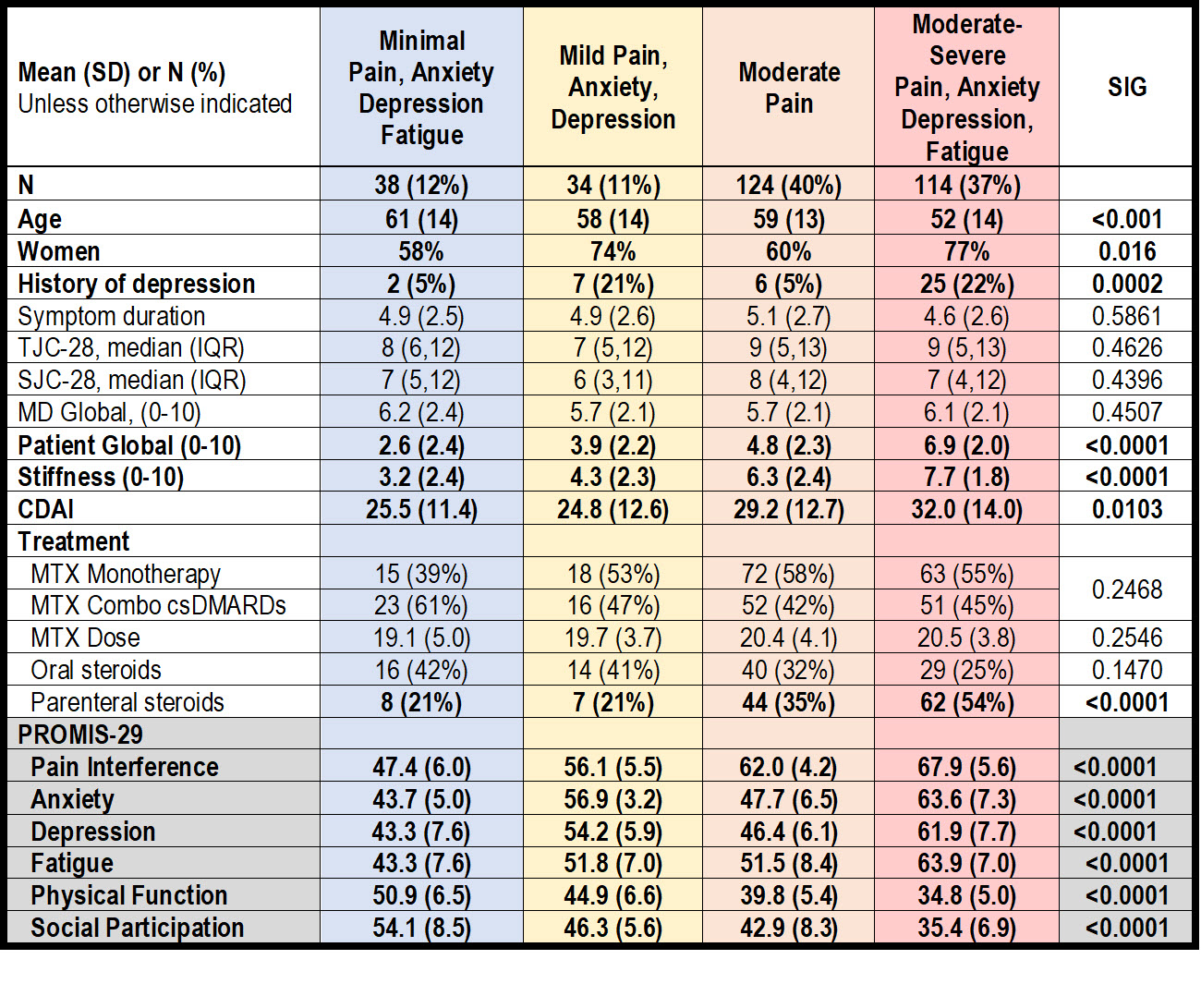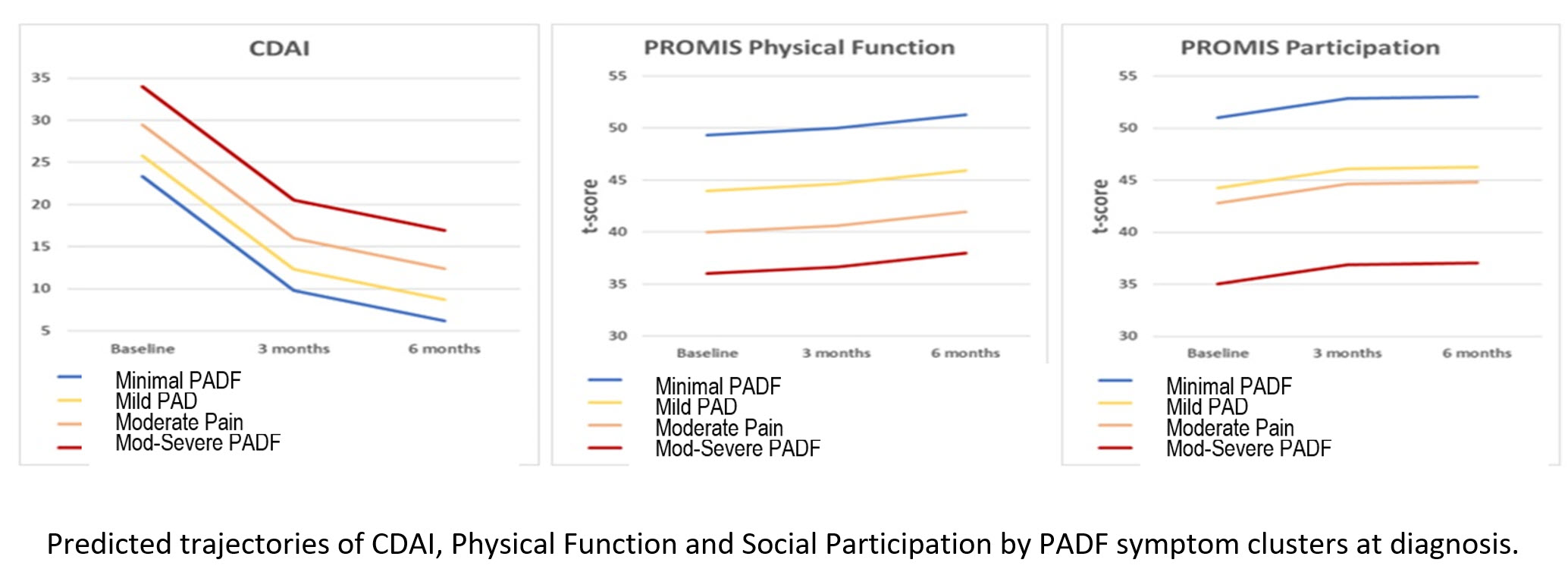Session Information
Session Type: Poster Session C
Session Time: 10:30AM-12:30PM
Background/Purpose: Growing evidence suggests that across chronic diseases, patients with co-occurring symptoms of pain, anxiety, and depression (PAD), known as “symptom clusters”, experience variable disease outcomes. We have previously applied a person-centered approach to group newly diagnosed early RA patients that yielded 4 distinct symptom cluster groups that were relatively stable over time using PAD + fatigue. Here we compare changes in RA disease activity, physical function, and participation across PADF groups over the first 6 months of MTX treatment.
Methods: Data were from newly diagnosed RA patients (symptoms< 1 year) enrolled in the Canadian Early Arthritis Cohort (CATCH) between Jan 2017-Aug 2022 with active disease and starting MTX. Participants underwent standardized assessments including PROMIS-29 at 0, 3, and 6 months. Latent Profile Analysis yielded 4 groups: 1) Minimal PADF; 2) Mild PAD; 3) Moderate Pain only; and 4) Moderate-Severe PADF. MTX response was assessed using CDAI, PROMIS Physical Function, and Social Participation. Multivariable mixed effects regression was used to estimate trajectories of disease activity, disability, and participation over the first 6-months across PADF groups updated at each time point adjusting for age, sex, race, education, smoking, obesity, comorbidities, symptom duration, seropositivity, and RA treatments.
Results: At enrolment, the 310 ERA adults had a mean (SD) age of 56 (14), and were mostly female (67%) and White (78%) with a mean CDAI of 29.3 (13.2) at diagnosis. All started MTX with no significant difference in dose or strategy across PAD groups (Table). All groups had high CDAI and MD Global scores at enrolment, though patients reporting moderate-severe PAD were significantly younger, more often had a history of depression, had the highest mean CDAI scores, patient global and stiffness scores, and greater impairments in physical function and participation. In adjusted regression models, all groups improved over 6 months, but patients with PADF consistently displayed worse trajectories of disease activity, function, and participation over the 6-month follow-up period in a dose reponse manner (Figure).
Conclusion: Evaluating the presence of co-occuring symptoms of pain, anxiety, and depression and fatigue (PADF) over the first 6 months could help better identify individuals at risk for poorer MTX response. These individuals may benefit from more aggressive pharmacologic and psychosocial interventions. Identifying and addressing residual PADF co-occuring symptoms may improve disease control and physical and social function in early RA helping to preserve autonomy, workforce participation, and QOL.
To cite this abstract in AMA style:
Bartlett S, Schieir O, Valois M, Bessette L, Pope J, Boire G, Hitchon C, Keystone E, Thorne C, Tin D, Hazlewood G, Allard-Chamard H, Kuriya B, Bykerk V, Bingham C. Treatment Response over the First 6 Months in Newly Diagosed RA Patients by Pain, Anxiety, Depression & Fatigue (PADF) Symptom Clusters: Results from the Canadian Early Arthritis Cohort [abstract]. Arthritis Rheumatol. 2024; 76 (suppl 9). https://acrabstracts.org/abstract/treatment-response-over-the-first-6-months-in-newly-diagosed-ra-patients-by-pain-anxiety-depression-fatigue-padf-symptom-clusters-results-from-the-canadian-early-arthritis-cohort/. Accessed .« Back to ACR Convergence 2024
ACR Meeting Abstracts - https://acrabstracts.org/abstract/treatment-response-over-the-first-6-months-in-newly-diagosed-ra-patients-by-pain-anxiety-depression-fatigue-padf-symptom-clusters-results-from-the-canadian-early-arthritis-cohort/


